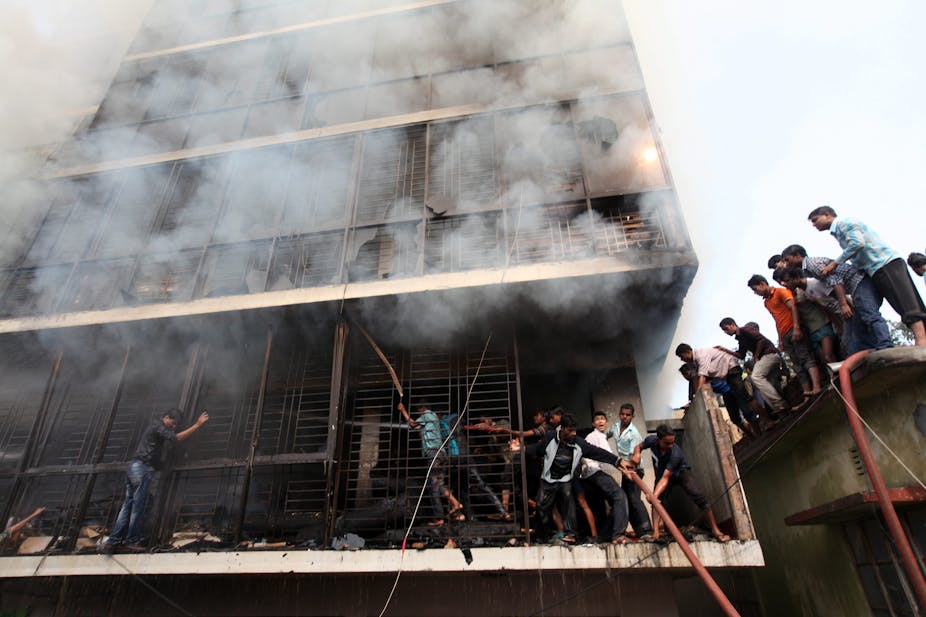In late 2012, at least 117 workers died in a garment factory fire in Dhaka, Bangladesh. Kalpona Akter, a union activist from Dhaka, and Sumi Abedin, a survivor of the fire, retold their stories at an Oxfam-sponsored event in Melbourne this month.
Akter vividly recalled what she saw after running to the factory just near her house. The building was ablaze; she watched helplessly as the factory burned with the workers trapped inside. Abedin escaped by leaping from a third-floor window, breaking a wrist and a leg.
Even as activists like Akter continue to push for change, the Abbott government is proposing to curtail worker activism. By extending secondary boycott provisions to cover activist groups, it could reduce civil society’s ability to express discontent against big business. Parliamentary secretary for agriculture Richard Colbeck, who wants to curb green activists, says it’s about “levelling the playing field” for business.
But citizens and civil society groups aren’t companies or unions in the industrial relations sense of the word. They are loose and responsive networks, there to give voice to those met with criminal injustice or corruption. Making it illegal for civil society groups like GetUp, Oxfam and Amnesty International to urge consumers to boycott companies for being poor corporate citizens is a type of despotism perpetuated by the executive.
Reform is a global challenge
The story of the Tazreen Fashions factory fire is not a new one. Nor is the Rana Plaza Complex collapse, which killed more than 1100 people. Last Thursday was the first anniversary of that disaster.
What is new is Akter’s revelation of the extent of the long struggle for compensation and protection against such disasters from factory owners, the Bangladeshi government (the national garment industry elite holds most seats) and international clothing companies.
In the case of the Rana Plaza collapse, initial estimates suggest US$40 million is needed to compensate the 1138 victims’ families and to pay for 2000 survivors’ medical treatment. To date, only seven of the 28 retailers linked to factories in the building have contributed.
Together with Bangladeshi union leaders, activist citizens worldwide are working to bring big business and the state to account. Since the disaster, Akter has met Walmart workers in Seattle wanting to show solidarity with Bangladeshis at the other end of the production line. She tells of protests in developed nations such as Belgium, Germany and Spain to name and shame clothing companies that source their garments from Bangladesh.
Activists like Akter and her international allies helped promote the Accord on Fire and Building Safety in Bangladesh and the Alliance for Bangladesh Worker Safety, among other civil society programs. The New York Times reports that it was mainly a push from “Western” retailers, especially after the Rana collapse, that led to these agreements.
In truth, these developments had more to do with the non-government organisations, governments, companies, vocal consumers and activists putting pressure on the companies to respond.
Over the past year, companies like adidas, Abercrombie & Fitch and Marks & Spencer have all signed the accord. This is no idle gesture. The accord is a legally binding agreement, with no less than the International Labour Organisation (ILO) as its chief administrator.
By signing the accord, companies take responsibility to ensure the factories that produce their clothing are structurally sound and provide safe working environments. It provides for regulatory visits by local union officials to ensure factories meet agreed standards and for money to be put aside in case factories require repair. Factory workers are to be paid a regular salary – not pay per piece.
If a breach of the accord occurs, and the company is found to be negligent, it can face legal charges in its “home country”. Depending on the severity of the breach (that is, mass loss of life as happened in Tazreen or Rana), a company could face charges of industrial homicide.

Activists drive campaign for justice
Akter was recently in Australia working with citizens, consumers, activists and NGOs to name and shame the Just Group (which includes Peter Alexander and Portmans in its portfolio) and Best and Less for failing to sign the accord. Just signed up to the less transparent and non-binding Alliance for Bangladesh Worker Safety.
The audience at the event also heard of abuses closer to home, involving Melburnians who were tricked or otherwise misinformed by companies to work under forced conditions in breach of federal and state labour laws.
Is the type of transnational activism Akter has spearheaded soon to be at risk in Australia from the Abbott government’s review of competition and consumer policy? Could Australians find it harder to express their discontent and stand in solidarity with each other and with foreign workers like Akter and Abedin? If so, then the dollar may have become sacred in Australia and the democratic profane.
No wonder Bruno Latour, one of the world’s leading social scientists, chided Tony Abbott in his lecture at the Danish Royal Academy of Sciences earlier this year. In the grand ballroom of world politics, Australia continues to embarrass itself.

